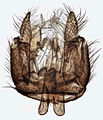
The Nematocera are a suborder of elongated flies with thin, segmented antennae and mostly aquatic larvae. Major families in the suborder include the mosquitoes, crane flies, gnats, black flies, and a group of families described as midges.
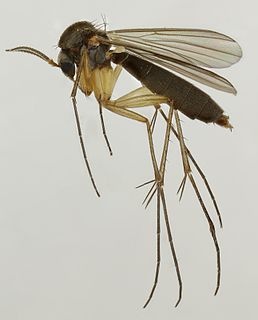
The Mycetophilidae are a family of small flies, forming the bulk of those species known as fungus gnats. About 3000 described species are placed in 150 genera, but the true number of species is undoubtedly much higher. They are generally found in the damp habitats favoured by their host fungi and sometimes form dense swarms.

The Diadocidiidae are a family of flies (Diptera), containing one extant genus with over 20 species and one extinct genus. Diadocidiidae are found worldwide, except in Africa and Antarctica. They are usually considered close to the Keroplatidae, Bolitophilidae, and Ditomyiidae, and used to be included in the Mycetophilidae. They are woodland flies, found in shaded places in forests or near streams. The larvae spin silken tubes under bark or in dead logs, and feed on hymenium of Polyporaceae fungi. The average body length for adults is around 2.5–5.6 mm.

Bolitophila is the sole living genus in the Bolitophilidae, a family of Diptera in the superfamily Sciaroidea, with around 40 Palaearctic and about 20 Nearctic species, and three species from the Oriental region (Taiwan). They are small (6–9 mm.)

The Ditomyiidae are a small family of flies (Diptera).They are found worldwide, most species are found in the Australasian and Neotropical realms. There are only two genera in Europe Ditomyia Winnertz, 1846 and Symmerus Walker, 1848 Ditomyia is found in Central Europe Symmerus in Northern Europe Symmerus is endemic to the Palaearctic.
Allocotocera is a genus of flies in the family of Mycetophilidae. Two of the species are found in Europe.

Bolitophila cinerea is a Palearctic species of 'fungus gnat' in the family Bolitophilidae.
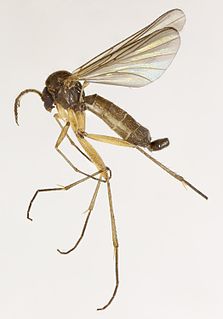
Boletina griphoides is a Palearctic species of 'fungus gnat' in the family Mycetophilidae.The larvae of B. griphoides are thought to be mycetophagous in the ground litter. Adults sometimes appear in enormous numbers in spring in a wide variety of habitats.
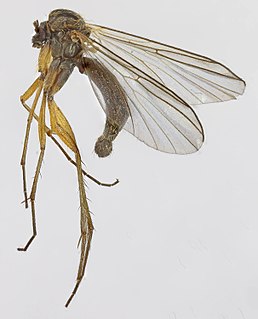
Boletina trispinosa is a Palearctic species of 'fungus gnat' in the family Mycetophilidae. Members of this genus are found in a wider variety of habitats from wooded streams to wetlands and open moorland. They make use of diverse breeding sites from the more normal habitat of rotting wood to mosses and liverworts. The breeding biology of most species is largely unknown.
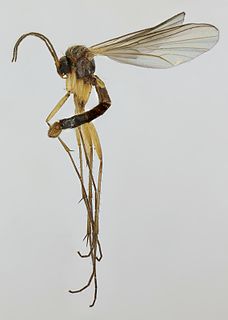
Coelosia tenella is a Palearctic species of 'fungus gnat' in the family Mycetophilidae. It is associated with Stereum.

Diadocidia ferruginosa is a Palearctic species of fungus gnat in the family Mycetophilidae. They live as larvae in long dry silken tubes under bark or in rotten wood and probably feed on fungal mycelia or spores. Also associated with Peniophora.

Boletina gripha is a Palearctic species of 'fungus gnats' in the family Mycetophilidae. It is found in a wide variety of habitats from wooded streams to wetlands and open moorland. Reared from brown rot of spruce stump, spruce log bearing loose bark and decaying wood of pine. Larvae have been on the surface of decaying wood covered with Resinicium bicolor, from soil in pine forest and from fruiting bodies of Suillus bovinus.

Brachypeza bisignata is a Palearctic species of 'fungus gnat' in the family Mycetophilidae. Reared from puffballs (Lycoperdales).

Boletina trivittata is a Palearctic species of 'fungus gnat' in the family Mycetophilidae. Members of this genus are found in a wider variety of habitats from wooded streams to wetlands and open moorland. Adults have been obtained in emergence traps in a range of situations including rotting wood and soil litter.
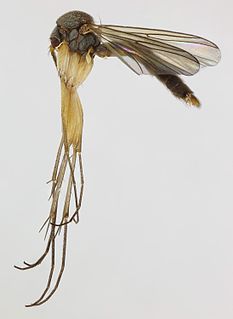
Brevicornu foliatum is a Palearctic species of 'fungus gnat' in the family Mycetophilidae. Members of this genus are found in a wider variety of habitats from wooded streams to wetlands and open moorland. Larvae develop in dead wood and in soil litter, feeding probably on microfungi.
Leptomorphus is a genus of fungus gnats in the family Mycetophilidae. There are about 8 described species in Leptomorphus.

Exechia is a genus of fungus gnats in the family Mycetophilidae. There are more than 180 described species in Exechia.
Pseudopamera nitidicollis is a species of dirt-colored seed bug in the family Rhyparochromidae. It is found in Central America and North America.
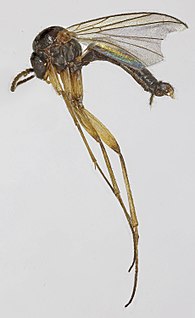
Acnemia is a genus of fly belonging to the family Mycetophilidae.

